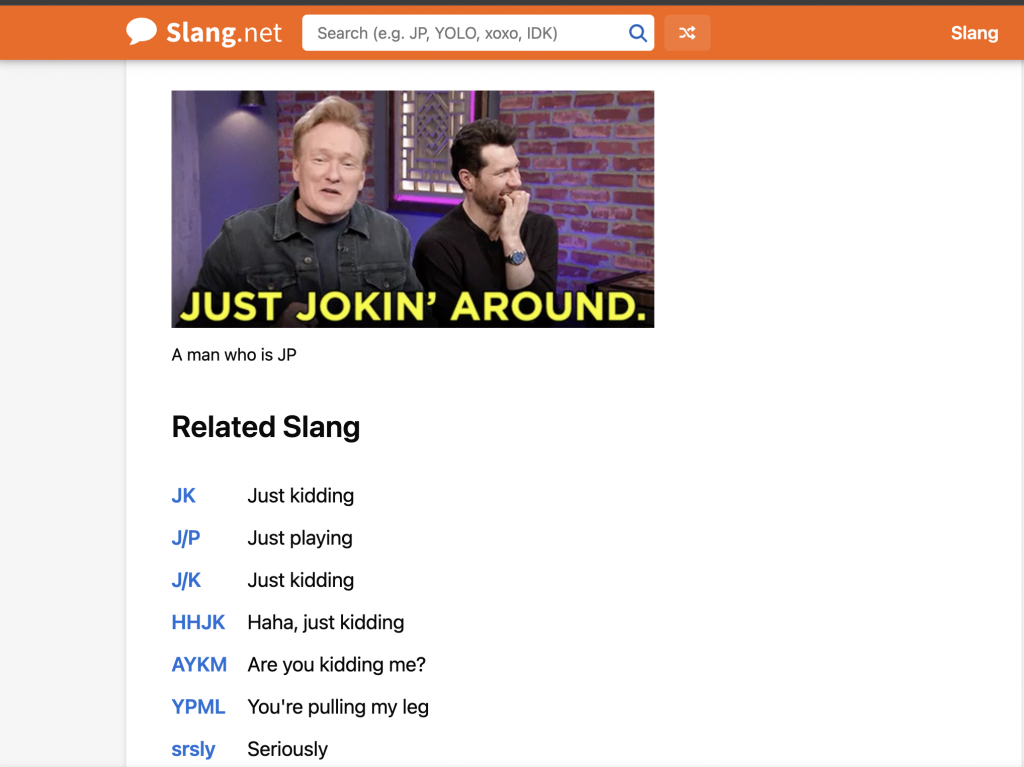JP is a commonly used abbreviation in online and text messaging. It is an acronym that, depending on the context, can refer to several distinct expressions. Differences in how JP is understood in different conversations can occasionally result in miscommunications. To prevent misunderstanding, it is vital to comprehend the various ways that JP might be interpreted.

This article will discuss the meaning of JP in texting, its several meanings, and a few other frequently used acronyms.
What Is JP?
JP is an acronym that, depending on the context, can represent a variety of expressions. “Just Playing” and “Joint Project” are JP’s two most typical meanings in text messaging. Nevertheless, several JP interpretations are applicable in certain situations.
JP might stand for “Just Playing” in a text message exchange. It’s frequently used to imply that someone is kidding around or not taking anything seriously. JP is comparable to other acronyms in this sense, including “JK” (just kidding) and “LOL” (laugh out loud).
JP can also refer to “Joint Project” in professional settings. When two or more people or groups work together, it’s a joint effort (JP).
More About JP
Typically, “JP” in texting refers to “just playing.” It’s frequently used to lighten a conversation’s mood or clarify that a prior comment was made in jest. Let’s examine its characteristics, applications, and significance in more detail.
Features
- Informality: “JP” is a colloquial acronym frequently used in social media posts, online conversations, and text messages. It gives the talk a more carefree and lighthearted tone.
- Clarity: It briefly explains that the previous message shouldn’t be taken too seriously. By doing this, miscommunication and disagreement in digital communication are prevented.
- Conciseness: “JP” lets users express their intended meaning succinctly, saving time and effort while typing. It is one of numerous texting abbreviations.
Use Cases
- Social Media Interactions: “JP” is frequently used to denote humor or sarcasm in remarks, captions, or answers on social media sites like Facebook, Instagram, and Twitter.
- Text Messaging: “JP” can explain amusing remarks or lighten the tone in one-on-one or group text chats. This ensures that the receiver understands the intended tone.
- Online gaming: When playing online games, participants can utilize the chat command “JP” to distinguish between important strategic conversations and lighthearted joking with other players.
- Forums and Chatrooms: Participants in online forums or chatrooms use “JP” to add levity to discussions or to indicate when a statement is meant in jest rather than as a serious assertion.
Importance
- Improves Communication: Using “JP” makes grasping easier and facilitates more seamless interactions in a digital environment where context and tone can be readily misunderstood.
- Builds Relationships: “JP” strengthens social ties in personal and professional contexts by conveying humor or lightheartedness, encouraging camaraderie and goodwill among discussion partners.
- Cultural Relevance: As language develops and individuals adjust to new kinds of connections in the digital age, texting abbreviations like “JP” have become deeply embedded in digital communication culture.
- Efficiency: In a time when concision is prized, “JP” enables users to communicate concisely while conserving time and screen real estate, especially in situations when character restrictions or attention spans are an issue.
Other Possible Interpretations Of JP
As was previously established, JP can mean different things in different situations. Here are a few ways that JP might be interpreted:
In addition to “just playing,” “JP” can have other meanings depending on the conversation context. Here are a few alternative interpretations of “JP” in chatting:
- Japanese: In some contexts, particularly in discussions related to language, culture, or travel, “JP” might refer to Japan or something Japanese. For example, if someone asks about a favorite cuisine, a response of “I love JP food” could mean Japanese cuisine.
- Job Posting: In professional settings or online forums, “JP” might stand for “job posting.” For instance, in a chat group for job seekers, someone might share a link with the message “New JP for software engineers at XYZ Company.”
- Just Published: When discussing articles, blog posts, or other written content, “JP” could indicate that something has just been published or released. For example, a friend might say, “Check out this JP on the latest tech trends.”
- Joint Project: In collaborative environments, especially in academic or professional settings, “JP” could signify a joint project. For instance, if two colleagues discuss their workload, one might say, “Let’s meet tomorrow to discuss the JP presentation.”
- Junior Partner: In business or legal contexts, “JP” might refer to a junior partner in a firm. For example, someone might say in a chat among lawyers, “JP Smith will handle the client meeting tomorrow.”
Challenges of Using “JP” in Chatting and How to Overcome Them
While “JP” can be a handy abbreviation for “just playing” in texting, it comes with its own set of challenges that users can encounter. Here are some common challenges and strategies to overcome them:
Misinterpretation
One of the main obstacles is the potential for misunderstanding. Without appropriate context or tone clues, receivers could misinterpret the meaning of “JP” and take a lighthearted comment too seriously.
- Solution: To emphasize the lighthearted tone, provide more information or use emoticons. For instance, adding a laughing emoji after “JP” might suggest that the message is intended to be humorous.
Ambiguity
“JP” might be unclear at times, particularly when it has several meanings that change depending on the conversational situation. This uncertainty can confuse the recipients.
- Solution: Make “JP” more obvious by using it in context or sending follow-up communications clarifying what it means. For example, to avoid misunderstanding, one should add “Just kidding” or “Just joking” instead of just stating “JP.”
Overuse
When “JP” is used too often, it loses some of its effect and gives the impression that the messages are not real or legitimate. Overusing “JP” can also lessen its ability to express lightheartedness or humor.
- Solution: Use “JP” sparingly and only when it benefits the discourse. Switch up your communication approach to make conversations interesting, and don’t just rely on “JP” to express humor.
Cultural Differences
“JP” might mean various things in different situations, which could cause miscommunication or unintentional offense.
- Solution: When employing “JP,” consider the recipient’s cultural peculiarities and prior information. To guarantee clarity, avoid caution and offer more background or explanation when in doubt.
FAQs
What does “JP” stand for in texting?
“JP” commonly stands for “just playing.” It’s often used to indicate that a previous statement was made in jest or to add a playful tone to a conversation.
How should I use “JP” when chatting?
Use “JP” to clarify when a message is meant in jest or to lighten the mood of a conversation. It’s best used sparingly when its meaning is clear to the recipient.
Are there alternative meanings for “JP” when chatting?
Yes, depending on the context, “JP” can also stand for “Japanese,” “job posting,” “just published,” “joint project,” or “junior partner.” Considering the conversation topic and context is important to determine the intended meaning.
How can I avoid misunderstandings when using “JP”?
To avoid misunderstandings, provide additional context or use emoticons to clarify the playful tone of your message. Be mindful of cultural differences and considerate of the recipient’s background when using “JP.”
Is it okay to use “JP” in professional or formal settings?
While “JP” is commonly used in informal communication, it can not be suitable for professional or formal settings where clarity and professionalism are paramount. Using complete sentences and avoiding texting abbreviations in such contexts is best.
What should I do if someone misunderstands my use of “JP”?
If someone misinterprets your use of “JP,” take the time to clarify your intent with a follow-up message. Apologize and provide additional context to ensure clear communication and avoid further confusion.
Final Thoughts
In digital communication, “JP” is a flexible acronym expressing humor and lightheartedness in texts. It provides efficiency and clarity when appropriately utilized, but issues like misunderstanding and abuse call for caution. By applying techniques such as contextualization and cultural awareness, users can leverage the potential of “JP” to improve their online interactions while reducing the likelihood of miscommunication.




